





(Speakers listed below in name alphabet order)
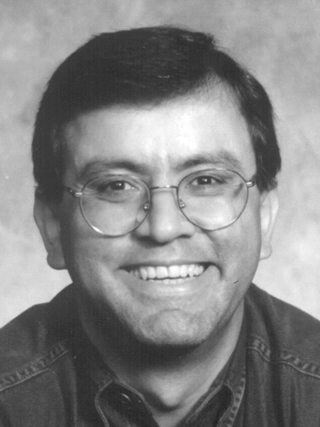
Ender Ayanoglu (IEEE Fellow)
Professor, University of California, Irvine, USA
Title: Achieving Optimum Received Power in the Smallest Number of Steps for Discrete-Phase RISs
Time: 10:30am-11:00am, Tuesday, February 20, 2024
Abstract:
The problem of optimizing discrete phases in a reconfigurable
intelligent surface (RIS) to maximize the received power at a user
equipment will be addressed. Necessary and sufficient conditions to
achieve this maximization will be given. These conditions are employed
in an algorithm to achieve the maximization. New versions of the
algorithm will be presented that are proven to achieve convergence in
N or fewer steps whether the direct link is completely blocked or not,
where N is the number of the RIS elements, whereas previously
published results achieve this in KN or 2N number of steps where K is
the number of discrete phases. Thus, for a discrete-phase RIS, the
techniques to be presented in this talk achieve the optimum received
power in the smallest number of steps published in the literature. In
addition, in each of those N steps, the techniques to be presented in
this talk determine only one or a small number of phase shifts with a
simple elementwise update rule, which result in a substantial
reduction of computation time, as compared to the algorithms in the
literature. As a secondary result, we will define the uniform polar
quantization (UPQ) algorithm. We will discuss its performance and
complexity in comparison to the optimum algorithms we will present.
Biography:
Ender Ayanoglu received the M.S. and Ph.D. degrees from Stanford University, Stanford, CA in 1982 and 1986, respectively, in electrical engineering. He was with the Communications Systems Research Laboratory, part of AT&T Bell Laboratories, Holmdel, NJ until 1996, and Bell Labs, Lucent Technologies until 1999. From 1999 until 2002, he was a Systems Architect at Cisco Systems, Inc., San Jose, CA. Since 2002, he has been a Professor in the Department of Electrical Engineering and Computer Science, University of California, Irvine, Irvine, CA, where he served as the Director of the Center for Pervasive Communications and Computing and held the Conexant-Broadcom Endowed Chair during 2002- 2010. His past accomplishments include invention of the 56K modems, characterization of wavelength conversion gain in Wavelength Division Multiplexed (WDM) systems, and diversity coding, a technique for link failure recovery in communication networks employing erasure coding in 1990, prior to the publication of the first papers on network coding. During 2000-2001, he served as the founding chair of the IEEE-ISTO Broadband Wireless Internet Forum (BWIF), an industry standards organization which developed and built a broadband wireless system employing Orthogonal Frequency Division Multiplexing (OFDM) and a Medium Access Control (MAC) algorithm that provides Quality-of-Service (QoS) guarantees. This system is the precursor of today’s Fourth Generation (4G) cellular wireless systems such as WiMAX, LTE, and LTEAdvanced. From 1993 until 2014 Dr. Ayanoglu was an Editor, and since January 2014 is a Senior Editor of the IEEE Transactions on Communications. He served as the Editor-in-Chief of the IEEE Transactions on Communications from 2004 to 2008. From 1990 to 2002, he served on the Executive Committee of the IEEE Communications Society Communication Theory Committee, and from 1999 to 2001, was its Chair. Dr. Ayanoglu is the recipient of the IEEE Communications Society Stephen O. Rice Prize Paper Award in 1995 and the IEEE Communications Society Best Tutorial Paper Award in 1997. He has been an IEEE Fellow since 1998.
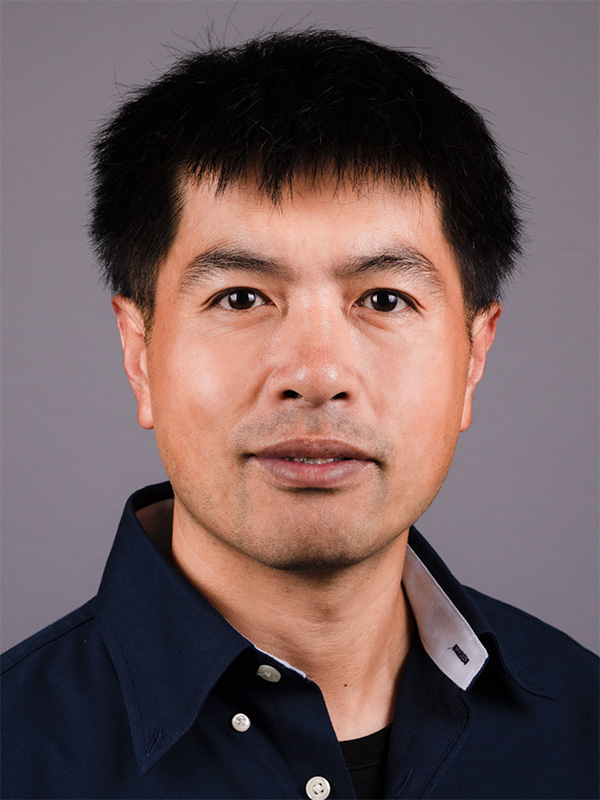
Zhipeng Cai (IEEE Fellow)
Professor, Georgia State University, USA
Title: Enhanced Privacy with GANs: Novel Models for Secure Data Publishing
Time: 17:30pm-18:00pm, Tuesday, February 20, 2024
Abstract:
Generative Adversarial Networks (GANs) have revolutionized the realm of data publishing by offering sophisticated methods to approximate complex data distributions. Their versatility extends to enhancing data publication fidelity, streamlining data management, facilitating knowledge extraction, and integrating information from diverse sources Our presentation targets these issues head-on by unveiling three advanced GAN frameworks within the cybersecurity arena. We will explore the Seed-Free Graph De-anonymization for network privacy, Privacy-Enhanced Graph Embedding for secure data sharing, and GAN applications in the autonomous vehicle sector. Empirical analysis on real-world datasets demonstrates the effectiveness and improved privacy assurances offered by our innovative models.
Biography: Dr. Zhipeng Cai is a Professor in the Department of Computer Science at Georgia State University and an Affiliate Professor in the Department of Computer Information System at Robinson College of Business. His expertise includes Resource Management, High Performance Computing, and Cyber-Security. Dr. Cai has over 100 publications and more than 15,000 citations, including 80 IEEE/ACM Transactions papers. Dr. Cai is an Editor-in-Chief for Wireless Communications and Mobile Computing, and an Associate Editor-in-Chief for Elsevier High-Confidence Computing Journal, as well as an editor for various prestigious journals, such as IEEE Transactions on Knowledge and Data Engineering (TKDE), IEEE Transactions on Vehicular Technology (TVT), IEEE Transactions on Wireless Communications (TWC), and IEEE Transactions on Computational Social Systems (TCSS). Dr. Cai has supervised over 20 PhD students, ten of whom are now tenure-track faculty members in US institutions. Dr. Cai is the recipient of an NSF CAREER Award and a Fellow of IEEE.

Yu Cheng (IEEE Fellow)
Professor, Illinois Institute of Technology, USA
Title: To Find the Supremacy of Machine Learning in Wireless Network Optimization
Time: 16:00pm-16:30pm, Wednesday, February 21, 2024
Abstract:
With the superior capability of discovering intricate structure of large data sets, machine learning has been widely applied in various areas including wireless networking. Modern wireless networks have seen a tremendous increase in size and complexity, where the capacity optimization urgently calls for an innovative and efficient computing paradigm. This talk shares our recent studies on how to exploit deep learning for significant performance gain in wireless network optimization. We start with a discussion about our vision of the supremacy of machine learning (ML), trying to fundamentally understand where and how the ML based approaches show advantages versus the conventional modeling-based approaches. We then demonstrate that ML has the unique capability to identify latent structure information, embedded in historical solved optimization instances but invisible to traditional algorithms, leading to new algorithms that can greatly mitigate the computation overhead while maintain a good performance. New ML techniques have been developed to extract and leverage the structure information from three perspectives: topology-level, algorithm-level, and application-level.
Biography: Yu Cheng received the B.E. and M.E. degrees in electronic engineering from Tsinghua University, Beijing, China, in 1995 and 1998, respectively, and the Ph.D. degree in electrical and computer engineering from the University of Waterloo, Waterloo, ON, Canada, in 2003. He is currently a Full Professor with the Department of Electrical and Computer Engineering, Illinois Institute of Technology, Chicago, IL, USA. His current research interests include wireless network performance analysis, machine learning, age of information, and network security. Dr. Cheng was a recipient of the Best Paper Award at QShine 2007, the IEEE ICC 2011, the Runner-Up Best Paper Award at ACM MobiHoc 2014, the National Science Foundation CAREER Award in 2011, and the IIT Sigma Xi Research Award in the Junior Faculty Division in 2013. He has served as several Symposium Co-Chairs for IEEE ICC and IEEE GLOBECOM, and the Technical Program Committee Co-Chair for WASA 2011 and ICNC 2015. He was a founding Vice Chair of the IEEE ComSoc Technical Subcommittee on Green Communications and Computing. He is an Associate Editor for the IEEE Transactions on Vehicular Technology, IEEE Internet of Things Journal, and IEEE Wireless Communications. He was an IEEE ComSoc Distinguished Lecturer from 2016 to 2017. He was elevated to IEEE Fellow in 2024.
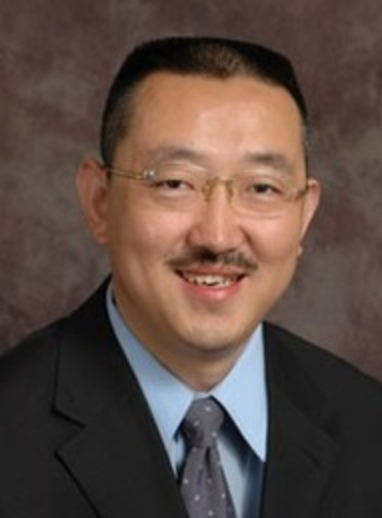
Song Ci (IEEE Fellow)
Professor, Tsinghua University, China.
Invited Talk Title: Building a Digital Power Computer for Green 6G
Time: 10:00am-10:30am, Thursday, February 22, 2024
Abstract:
In the upcoming era of 6G, the number of base stations, edge computing nodes and data centers is believed to be multifold, imposing a serious challenge on the network deployment and operation, especially on its how to power 6G networks in a green and sustainable way. With ever-increasing penetration rate of renewable energy in power grids, the traditional analog ICT powering systems cannot meet rigorous requirements on power feeding systems posed by 6G network application scenarios. Thanks to the recent breakthrough of power electronics semiconductors, such as power MOSFET, SiC and GaN with their outstanding material properties, it becomes feasible to carry out digital power signal processing at high switching speed, high voltage, and feverish temperature. By building a new “digital power computer” using highly efficient low voltage power switches, traditional analog power feeding systems can be transformed into digital systems, turning into a new type of network devices. In this talk, we will propose and describe the basic concept of digital power computing and the system architecture of digital power computer. Results of experiments and real-world applications show the effectiveness and efficiency of digital power computer, which offering a promising disruptive path to sustainable power feeding for green 6G.
Biography:
Dr. Song Ci is a Professor with the Electrical Engineering Department, Tsinghua University, China. He is the Founding Director of the MOE-China Mobile Joint Laboratory on ICT-Energy, a Global Visiting Professor of Technical University of Munich, and the Founder and Chief Scientist of iBatteryCloud, a digital energy storage company. His current research interests include large-scale dynamic complex system modeling and optimization, digital energy processing and computing, energy Internet and sustainable ICT. He has authored more than 300 peer-reviewed articles in those areas. He is a Fellow of IEEE and a member of ACM. He has served as an Editor or a Guest Editor in many journals and served on TPCs of numerous international conferences.
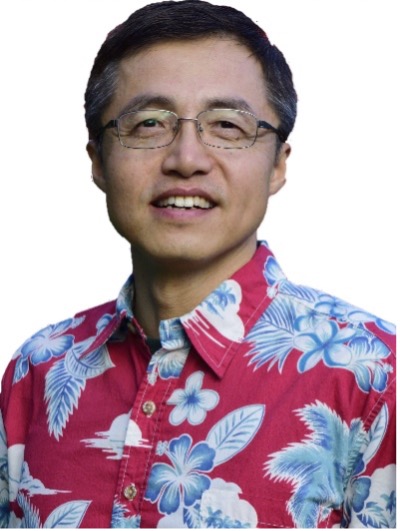
Yingfei Dong
Professor, University of Hawaii at Manoa (UHM), USA
Invited Talk Title: GPS Spoofing on Individual Drones and Drone Swarms
Time: 10:30am-11:00am, Thursday, February 22, 2024
Abstract:
We will first present an accurate GPS spoofing attack on individual drones, and then discuss advanced swarm spoofing problems. First, while many existing spoofing methods can disrupt drone invasions, they cannot accurately guide a drone to a desired location. To address this issue, we propose the Drone Position Manipulation (DPM) attack to exploit the path-following navigation algorithms to accurately redirect an invading drone to a desired location, by carefully crafting the spoofed guidance inputs. We evaluate the attack on the Software-in-the-loop (SITL) module of ArduPilot system to show its effectiveness.
Second, while most such spoofing attacks focus on a single receiver, we investigate the impacts of a single spoofer on multiple receivers. Our analysis shows that, using a single spoofer, multiple receivers at different locations in a spoofing area will see the same location reading. We conduct real-world experiments to validate our analysis. Furthermore, because very little systematic research on swarming spoofing has been conducted, we develop a basic model to show the theoretical capabilities and limitations of swarm spoofing. We then broaden the basic model to explore the theoretical capabilities and limitations of swarm spoofing under various assumptions and constraints. Although this work focuses on the GPS system, the research can be easily applied to other GNSSs, such as Galileo or GLONASS.
Biography:
Yingfei Dong received his B.S. and M.S. degrees in Computer Science at Harbin Institute of Technology, P.R. China, in 1989 and 1992, Doctor degree in Engineering at Tsinghua University in 1996, and Ph.D. in Computer Science at the University of Minnesota in 2003. He is a Professor at the Department of Electrical and Computer Engineering at the University of Hawaii at Manoa (UHM). His current research focuses on computer and network security, data privacy, and secure applications, including consumer drone security and applications, CPS/IoT security, big data security and privacy, cloud security, real-time control networking, and distributed algorithms and applications. He has published over 100 refereed research papers in various international journals and conferences. He has also served as associated editors for multiple international journals, and as organizers and technical program committee members for many IEEE/ACM/IFIP conferences. His research is supported by NSF, ONR, Air Force Research Lab, Navy Applied Research Lab, and industrial partners.
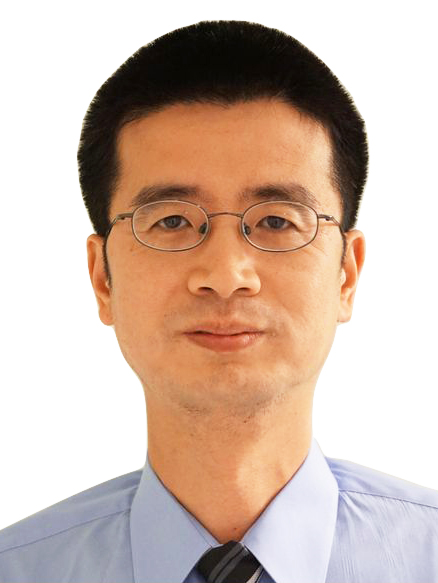
Xinwen Fu
Professor, University of Massachusetts Lowell, USA
Title: Building Automation System Security
Time: 10:00am-10:30am, Tuesday, February 20, 2024
Abstract:
Building Automation Systems (BASs) are seeing increased usage in modern society due to the plethora of benefits they provide such as automation for climate control, HVAC systems, entry systems, and lighting controls. Many BASs in use are outdated and suffer from numerous vulnerabilities that stem from the design of the underlying BAS protocol. In this talk, we provide a comprehensive, up-to-date survey on BASs and attacks against seven BAS protocols including BACnet, EnOcean, KNX, LonWorks, Modbus, ZigBee, and Z-Wave. Holistic studies of secure BAS protocols will also be presented, covering BACnet Secure Connect, KNX Data Secure, KNX/IP Secure, ModBus/TCP Security, EnOcean High Security and Z-Wave Plus. LonWorks and ZigBee do not have security extensions. We point out how these security protocols improve the security of the BAS and what issues remain. A case study is provided which describes a real-world BAS and showcases its vulnerabilities as well as recommendations for improving the security of it. We seek to raise awareness to those in academia and industry as well as highlight open problems within BAS security.
Biography:
Dr. Xinwen Fu is a Professor in the Department of Computer Science, University of Massachusetts Lowell. He was a tenured Associate Professor at University of Central Florida. His current research interests are in computer and network security and privacy. Dr. Fu has published at prestigious conferences including the four top computer security conferences (Oakland, CCS, USENIX Security and NDSS), and journals such as ACM/IEEE Transactions on Networking (ToN) and IEEE Transactions on Dependable and Secure Computing (TDSC). He spoke at various technical security conferences including Black Hat. His research was reported by various Media including CNN, Wired, Huffington Post, Forbes, Yahoo, MIT Technology Review, PC Magazine and aired on CNN Domestic and International and the State Science and Education Channel of China (CCTV 10).
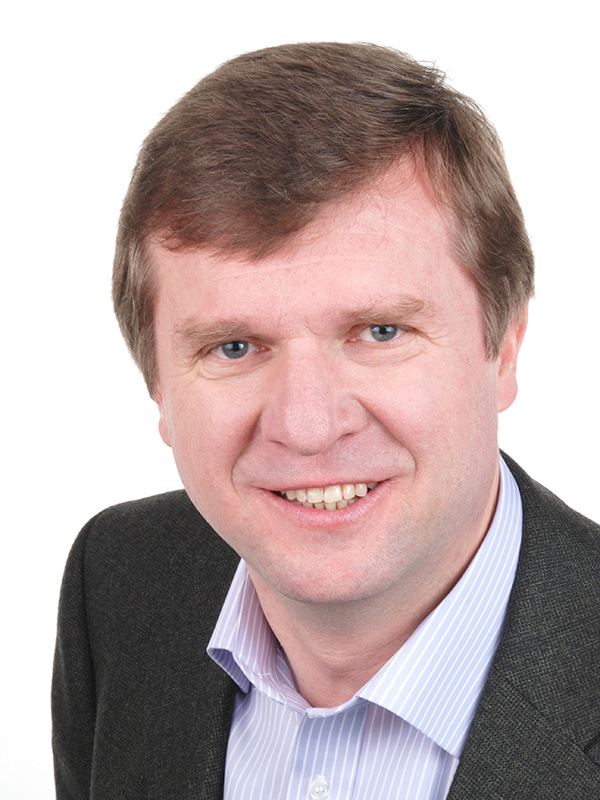
Sergei Gorlatch
Professor, University of Muenster, Germany
Title: High-Level Development of Networked Applications with RT QoS Requirements
Time: 11:30am-12:00pm, Tuesday, February 20, 2024
Abstract:
Real-Time Online Interactive Applications (ROIA) are networked applications connecting a potentially very high number of users who interact with the application and with each other in real time, i.e., a response to a user’s action happens virtually immediately. Typical representatives of ROIA are multiplayer online computer games, advanced simulation-based e-learning, and serious gaming. All these applications are characterized by high performance and QoS requirements, such as: short response times to user inputs (about 0.1-1.5 s); frequent state updates (up to 100 Hz); large and frequently changing numbers of users in a single application instance (up to tens of thousands simultaneous users). This talk will address two challenging aspects of developing such applications:
a) using Mobile Cloud Computing for allowing high application performance when a ROIA application is accessed from multiple mobile devices, and b) managing dynamic QoS requirements of ROIA applications by employing the technology of Software-Defined Networking (SDN).
Biography:
Sergei Gorlatch is Full Professor of Computer Science at the University of Muenster (Germany) since 2003. Earlier he was Associate Professor at the Technical University of Berlin, Assistant Professor at the University of Passau, and Humboldt Research Fellow at the Technical University of Munich, all in Germany. Prof. Gorlatch has more than 200 peer-reviewed publications in renowned international books, journals and conferences. He was principal investigator in several international research and development projects in the field of software for parallel, distributed, Grid and Cloud systems and networking, funded by the European Community and by German national bodies.
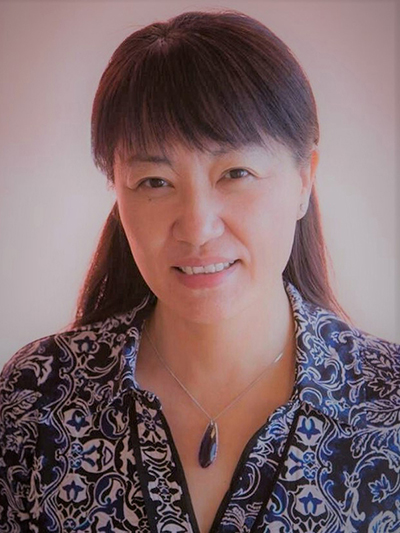
Rose Hu (IEEE Fellow)
Professor, Utah State University, USA
Invited Talk Title: WiSegRT: Dataset for Site-Specific Indoor Radio Propagation Modeling with 3D Segmentation and Differentiable Ray-Tracing
Time: 10:00am-10:30am, Wednesday, February 21, 2024
Abstract:
The accurate modeling of indoor radio propagation is crucial for localization, monitoring, and device coordination,
yet remains a formidable challenge, due to the complex nature of indoor environments where radio can propagate along
hundreds of paths. These paths are resulted from the room layout, furniture, appliances and even small objects like a
glass cup. They are also influenced by the object material and surface roughness. Advanced machine learning (ML) techniques
have the potential to take such non-linear and hard-to-model factors into consideration. However, extensive and fine-grained datasets are urgently required. This paper presents WiSegRT1, an open-source dataset for indoor radio propagation modeling. Generated by a differentiable ray tracer within the segmented 3-dimensional (3D) indoor environments, WiSegRT provides site-specific channel impulse responses for each grid point relative to the given transmitter location. We expect WiSegRT to support a wide-range of applications, such as ML-based channel prediction, accurate indoor localization, radio-based object detection, wireless digital twin, and more.
Biography:
Prof. Rose Qingyang Hu is currently associate dean for research of College of Engineering and full professor of Electrical and Computer Engineering Department at Utah State University. She received her B.S. degree from University of Science and Technology of China, her M.S. degree from New York University, and her Ph.D. degree from the University of Kansas. Besides 10 years' academia research experience, Prof. Hu also has more than 10 years R&D experience with Nortel, Blackberry and Intel as technical manager, senior research scientist, and senior wireless system architect, actively participating in industrial 3G/4G technology development, standardization, system level simulation and performance evaluation. Her current research interests include next-generation wireless communications, wireless network design and optimization, Internet of Things, Cloud computing/Fog computing, multimedia QoS/QoE, wireless system modeling and performance analysis. She has published more than 200 papers in top IEEE journals and conferences and holds over 30 patents in her research areas. Prof. Hu is an IEEE Communications Society Distinguished Lecturer 2015-2018 and recipient of Best Paper Awards from IEEE Globecom 2012, IEEE ICC 2015, IEEE VTC Spring 2016, and IEEE ICC 2016. She served as Tchnology, IEEE Communications Magazine, IEEE Wireless Communications Magazine.
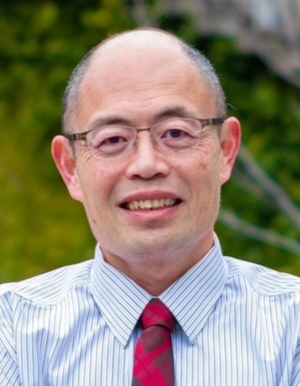
Chin-Tser Huang
Professor, University of South Carolina, USA
Title: Reliably Putting Their Heads Together: Application of Probabilistic Blockchain in Multi-Agent Decision-Making Systems
Time: 16:30pm-17:00pm, Wednesday, February 21, 2024
Abstract:
Designed as a distributed data storage system, blockchain employs a consensus mechanism to validate the addition of new data blocks while saving the need for mediation by a centralized server. However, when the blockchain technology is applied in decision-making applications, the consensus mechanism requires the decision to be deterministic, which will ignore different recommendations made by multiple agents and may put the computing system at the risk of missing valid insights. In this talk, we will first introduce the concept of probabilistic blockchain and compare the strengths and weaknesses of some existing approaches. Then, we introduce our solution called SMARPchain, which is a paradigm of reputational probabilistic blockchain based on the incorporation of smart markers. The distinguishing characteristic of SMARPchain is that it enables multiway branching which allows the result produced by each agent to be kept on the blockchain as a branchchain. Moreover, SMARPchain computes a probabilistic score on each branchchain based on the associated agent’s reputation to help the decision maker reach an informed decision. Our evaluation results show that SMARPchain will enhance the security and robustness of multi-agent decision-making systems with acceptable overhead.
Biography:
Dr. Chin-Tser Huang is a Professor in the Department of Computer Science and Engineering at University of South Carolina at Columbia. He received the B.S. degree in Computer Science and Information Engineering from National Taiwan University, Taipei, Taiwan, in 1993, and the M.S. and Ph.D. degrees in Computer Sciences from The University of Texas at Austin in 1998 and 2003, respectively. His research interests include network security, network protocol design and verification, and distributed systems. He is the director of the Secure Protocol Implementation and Development (SPID) Laboratory at the University of South Carolina. He is the author (along with Mohamed Gouda) of the book “Hop Integrity in the Internet,” published by Springer in 2005. His research has been funded by DARPA, AFOSR, AFRL, NSF, NEH, and USDOT. He is an NRC Research Associate in 2020, and a recipient of the USAF Summer Faculty Fellowship Award and of the AFRL Visiting Faculty Research Program Award in 2008-2023. He is a Senior Member of IEEE and ACM.
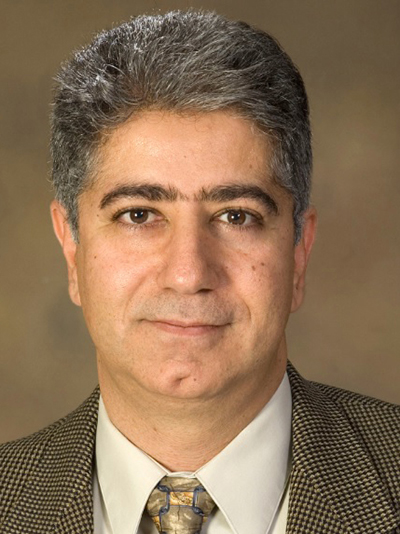
Marwan Krunz (IEEE Fellow)
Kenneth VonBehren Endowed Professor, The University of Arizona, USA.
Invited Talk Title: Synthesizing RF Coverage Maps for Wireless Systems Using Generative AI
Time: 16:00pm-16:30pm, Tuesday, February 20, 2024
Abstract:
Network planning, spectrum-access coordination, and protocol adaptation can be greatly facilitated using RF maps, which can be obtained for various bands of interest, including the heavily congested mid-band spectrum as well as millimeter-wave (mmWave) and sub-THz bands. However, acquiring such maps through site surveys is quite labor-intensive and sometimes not feasible. One solution is to use ray-tracing simulations, which incur significant computational overhead and may necessitate simplifications that impact the accuracy of this approach. As a computationally efficient alternative, we advocate the use of generative adversarial networks (GANs) for synthesizing RF coverage maps. First, we introduce a GAN-based approach for RF map Estimation and Categorization through Unsupervised Attribute Extraction (RecuGAN). RecuGAN incorporates various attributes to capture the diversity of the RF environment. We show that once trained, a RecuGAN has the ability to generate RF maps with specific attribute values. Next, we present a semantics-based GAN for synthesis of RF maps with attribute values not previously seen in the training set. We refer to such maps as “extrapolated maps.” They include, for example, scenarios where the GAN is trained on RF maps of one environment (e.g., a given floor plan) but used to synthesize RF maps for another environment. Other aspects of extrapolation include antenna array size, transmitter location, and center frequency. Comparison between AI-generated RF maps and their simulated/measured counterparts demonstrate the effectiveness of the proposed approaches in synthesizing maps for different indoor environments and parameter settings.
Biography:
Marwan Krunz is a Regents Professor at the University of Arizona. He holds the Kenneth VonBehren Endowed Professorship in ECE and is also a professor of computer science. He directs the Broadband Wireless Access and Applications Center (BWAC), a multi-university NSF/industry center that focuses on next-generation wireless technologies. He also holds a courtesy appointment as a professor at University Technology Sydney. Previously, he served as the site director for the Connection One center. Dr. Krunz’s research is on resource management, network protocols, and security for wireless systems. He has published more than 300 journal articles and peer-reviewed conference papers, and is a named inventor on 12 patents. His latest h-index is 60. He is an IEEE Fellow, an Arizona Engineering Faculty Fellow, and an IEEE Communications Society Distinguished Lecturer (2013-2015). He received the NSF CAREER award. He served as the Editor-in-Chief for the IEEE Transactions on Mobile Computing. He also served as editor for numerous IEEE journals. He was the TPC chair for INFOCOM’04, SECON’05, WoWMoM’06, and Hot Interconnects 9. He was the general vice-chair for WiOpt 2016 and general co-chair for WiSec’12. Dr. Krunz served as chief scientist for two startup companies that focus on 5G and beyond systems and machine learning for wireless communications.
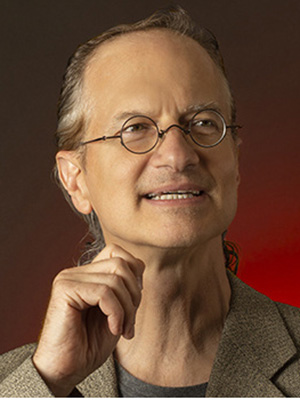
David W. Matolak (IEEE Fellow)
Professor, University of South Carolina, USA
Invited Talk Title: Reliable Communications for Future Aviation
Time: 17:00pm-17:30pm, Wednesday, February 21, 2024
Abstract:
Rapid growth in aviation will require advances in air-ground and air-air communications,
navigation, and surveillance (CNS). Projects like NASA’s Advanced Air Mobility (AAM), which is
aimed at the transportation of both cargo and people in low-altitude flights in and around urban areas, require extremely high-reliability links, often with low latencies. In this presentation, we provide background on aviation trends and existing requirements, outline future plans, then focus on reliable air-ground (AG) communications. For this we discuss both intrinsic challenges such as wireless channel impairments and spectrum constraints, as well as extrinsic challenges such as interference, both unintentional and intentional (i.e., jamming). After a brief review of reliability techniques at the network and data link layers, we direct attention to the physical layer, and discuss in some detail AG channel effects, then transmission security (transec) and anti-jam (AJ) techniques. We illustrate that by taking an adversary’s perspective we can improve link design and operation. The talk will conclude with comments on the future potential of machine learning and artificial intelligence, along with other areas for future work.
Biography:
David W. Matolak received the B.S. degree from The Pennsylvania State University, M.S. degree from The University of Massachusetts, and Ph.D. degree from The University of Virginia, all in electrical engineering. He has over 25 years’ experience in communication system research, development, and deployment, with industry, government institutions, and academia, including AT&T Bell Labs, L3 Communication Systems, MITRE, and Lockheed Martin. He has over 270 refereed publications and ten patents. He was a professor at Ohio University (1999-2012), and since 2012 has been a professor at the University of South Carolina. He has been Associate Editor for several IEEE journals, and has delivered several dozen invited presentations at a variety of international venues. His research interests are radio channel modeling, communication techniques for non-stationary fading channels, and secure communications. Prof. Matolak is a Fellow of the IEEE, a member of standards groups in RTCA and ITU, and a member of Eta Kappa Nu, Sigma Xi, Tau Beta Pi, URSI, ASEE, AAAS, and AIAA.
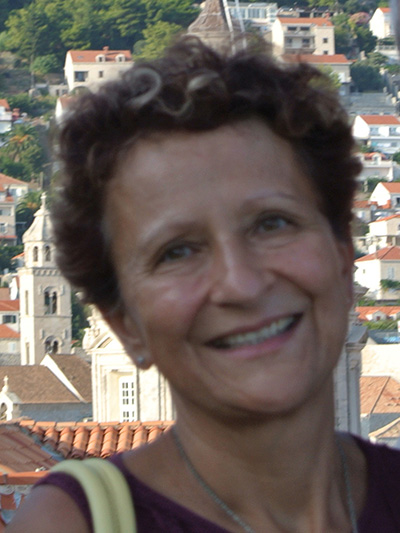
Jelena Misic (IEEE Fellow)
Professor, Ryerson University, Canada
Invited Talk Title: Deploying Proof of Stake and Delegated Proof of Stake consensus protocols for blockchains in IoT environments.
Time: 11:00am-11:30am, Wednesday, February 21, 2024
Abstract:
Blockchain ledgers are being increasingly used in Internet of Things (IoT) and Internet of Vehicles (IoV) applications. However, Proof of Work consensus is unsuitable in an IoV setting, which is why other paradigms need to be investigated.
In this talk we discuss Proof of Stake (PoS) and Delegated Proof of Stake (DPoS) techniques in IoT environment. We integrate PoS and DPoS consensus technique with multiple entry Practical Byzantine Fault Tolerance voting in a permissioned blockchain network.
We introduce several PoS/DPoS classes based on combination of initial stake and truthfulness of voting. For DPoS we introduce concept of virtual stake which is used to elect leaders and witnesses based on their behavior.
Using a Semi Markov Process-based model, we derive the probability of reaching consensus and highlight the impact of the populations of individual stake/priority classes on achieving consensus. We also describe a differentiated medium access approach similar to Enhanced Distribution Function (EDCA).
We also discuss quantum implementation of PoS and DPoS consensus algorithms for IoT blockchains.
Biography:
Jelena Misic is a Professor in the Department of Computer Science at Ryerson University, Canada. She received her PhD in Computer Engineering from University of Belgrade, Serbia, in 1993. She is an internationally recognized expert in the area of IoT, blockchain, wireless networking and network security, where she has authored or co-authored four books, 155+ journal papers, 24 book chapters, and 215+ conference papers. She has chaired more than a dozen major international events and guest-edited more than a dozen special issues of various journals. She serves on the editorial boards of IEEE Transactions on Vehicular Technology, IEEE Internet of Things Journal, IEEE Transactions on Emerging Topics in Computing, IEEE Network, ACM Computing Surveys and Ad Hoc Networks journal (published by Elsevier). She is an IEEE Fellow, ACM member and serves as IEEE VTS distinguished lecturer.
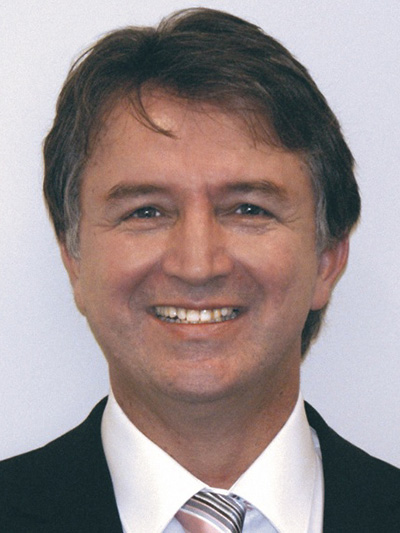
Panos Nasiopoulos (IEEE/CAE Fellow)
TELUS Mobility Research Chair Professor, University of British Columbia, Canada
Invited Talk Title: Navigating Urban Gridlock: An Innovative Real-Time Street Parking Solution for Human-Driven and Autonomous Vehicles
Time: 16:00pm-16:30pm, Thursday, February 22, 2024
Abstract:
In this talk, we address the widespread issue of traffic congestion in metropolitan areas, highlighting its negative impacts such as delays, heightened fuel consumption, environmental pollution, and diminished quality of life. The focus shifts to a detailed examination of an innovative real-time street parking detection and localization system. Tailored for both human-driven and autonomous vehicles, this system aims to offer a holistic solution to the complexities associated with urban traffic congestion.
Biography:
Dr. Panos Nasiopoulos is a professor with the Department of Electrical and Computer Engineering and the former Director of the Institute for Computing, Information and Cognitive Systems and the Master of Software Systems at UBC. Before joining UBC, he was the President of Daikin Comtec US (co-founder of DVD) and Executive Vice President of Sonic Solutions. His research interests are primarily in the area of intelligent digital media, visual information capture and delivery, artificial intelligence in digital media with focus on entertainment, security, autonomous driving, smart cities and health, he is the author or the co-author of numerous research publications and patents. He is a registered member of the Association of Professional Engineers and Geoscientists of British Columbia (APEGBC), a Fellow of IEEE, a Fellow of the Canadian Academy of Engineering, and has been an active member of the Standards Council of Canada, MPEG and IEEE.
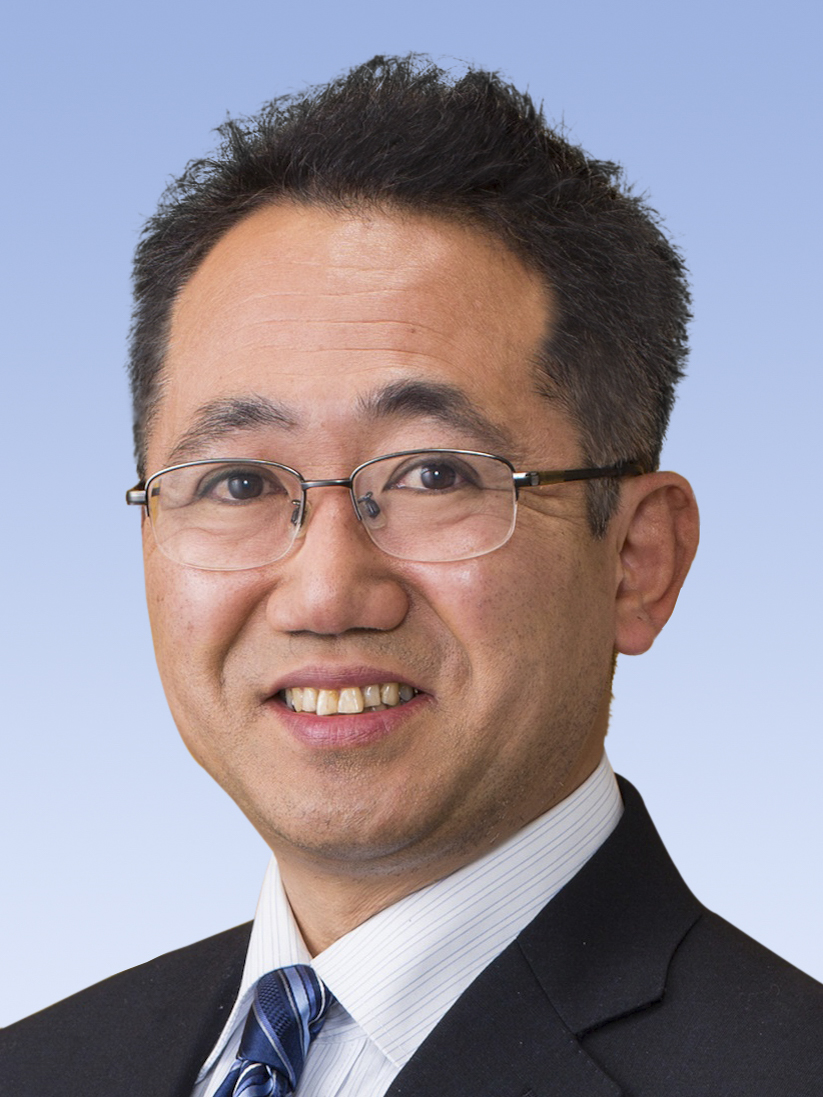
Eiji Oki (IEEE/IEICE Fellow)
Professor, Kyoto University, Japan
Invited Talk Title: Service Deployment with Priority Control in Network Function Virtualization
Time: 11:00am-11:30am, Tuesday, February 20, 2024
Abstract:
Network function virtualization (NFV) makes deploying network services
more flexible with virtual network functions (VNFs). Network resources
in an NFV environment can be provisioned elastically to handle
heterogeneous services. A service provider must allocate the required
VNFs to hosts, satisfying different service delay requirements. It is
challenging for service providers to deploy services efficiently.
Priority control is the key to success in sharing resources
effectively. This talk addresses the challenges of service deployment
with priority control in NFV.
Biography:
Eiji Oki is a Professor at Kyoto University, Kyoto, Japan. He received the B.E. and M.E. degrees in instrumentation engineering and a Ph.D. degree in electrical engineering from Keio University, Yokohama, Japan, in 1991, 1993, and 1999, respectively. In 1993, he joined Nippon Telegraph and Telephone Corporation (NTT) Communication Switching Laboratories, Tokyo, Japan. He has been researching network design and control, traffic-control methods, and high-speed switching systems. From 2000 to 2001, he was a Visiting Scholar at the Polytechnic Institute of New York University, Brooklyn, New York, where he was involved in designing terabit switch/router systems. He was engaged in researching and developing high-speed optical IP backbone networks with NTT Laboratories. He was with The University of Electro-Communications, Tokyo, Japan from July 2008 to February 2017. He joined Kyoto University, Japan in March 2017. He has been active in the standardization of the path computation element (PCE) and GMPLS in the IETF. He wrote more than ten IETF RFCs. Prof. Oki was the recipient of several prestigious awards, including the 1998 Switching System Research Award and the 1999 Excellent Paper Award presented by IEICE, the 2001 Asia-Pacific Outstanding Young Researcher Award presented by IEEE Communications Society for his contributions to broadband network, ATM, and optical IP technologies, the 2010 Telecom System Technology Prize by the Telecommunications Advanced Foundation, IEEE HPSR 2012 Outstanding Paper Award, IEEE HPSR 2014 Best Paper Award Finalist, First Runner Up, and the 2015 IEICE Achievement Award. He has authored/co-authored four books, Broadband Packet Switching Technologies, published by John Wiley, New York, in 2001, GMPLS Technologies, published by CRC Press, Boca Raton, FL, in 2005, Advanced Internet Protocols, Services, and Applications, published by Wiley, New York, in 2012, and Linear Programming and Algorithms for Communication Networks, CRC Press, Boca Raton, FL, in 2012. He is a Fellow of IEEE and IEICE.
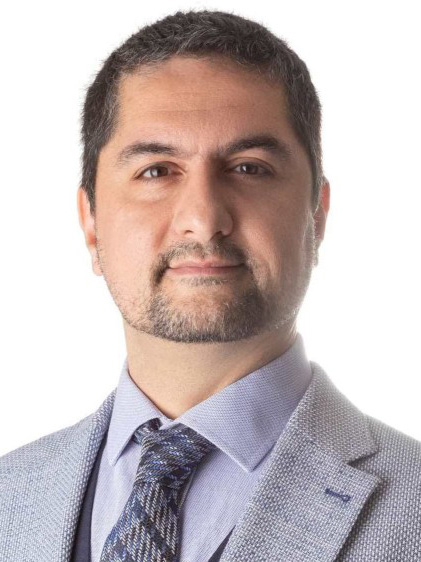
Shervin Shirmohammadi (IEEE Fellow)
Professor, University of Ottawa, Canada
Invited Talk Title: Improving Network Operation Center Automation with Reinforcement Learning
Time: 11:00am-11:30am, Thursday, February 22, 2024
Abstract:
Today’s Network Operation Centres (NOC) consist of teams of network professionals responsible for monitoring and taking actions for their network’s health. Most of these NOC actions are relatively complex and executed manually; only the simplest tasks can be automated with rules-based software. But today’s networks are getting larger and more complex. Therefore, deciding what action to take in the face of non-trivial problems has essentially become an art that depends on collective human intelligence of NOC technicians, specialized support teams organized by technology domains, and vendors’ technical support. This model is getting increasingly expensive and inefficient; hence, the automation of all or at least some NOC tasks is now considered a desirable step towards autonomous and self-healing networks. In this talk, we describe the design of an autonomous NOC that can recommend or take actions that lead to better results than those achieved by human expert rules. Specifically, we use Reinforcement Learning and train it with expert rules, and let it explore actions by itself. We then show that it can learn new and more efficient strategies that outperform expert rules.
Biography:
Shervin Shirmohammadi (M ’04, SM ’04, F ’17) received his Ph.D. in Electrical Engineering in 2000 from the University of Ottawa, Canada, and after spending 3 years in the industry as a senior architect and project manager, joined as Assistant Professor the same University, where since 2012 he has been a Full Professor with the School of Electrical Engineering and Computer Science. He is Director of the Discover Laboratory, doing research in machine learning-assisted measurements, especially vision-based measurement, IoT measurements, and multimedia and network measurements. The results of his research, funded by more than $28 million from public and private sectors, have led to over 400 publications, over 70 researchers trained at the postdoctoral, PhD, and Master’s levels, 30+ patents and technology transfers to the private sector, and four Best Paper awards. He is the founding Editor-in-Chief of the IEEE Open Journal of Instrumentation and Measurement, an Associate Editor of ACM Transactions on Multimedia Computing Communications and Applications, and was the Editor-in-Chief of the IEEE Transactions on Instrumentation and Measurement from 2017 to 2021.
Dr. Shirmohammadi is an IEEE Fellow “for contributions to multimedia systems and network measurements”, and recipient of the 2019 George S. Glinski Award for Excellence in Research, the 2021 IEEE IMS Distinguished Service Award, and the 2023 IEEE IMS Technical Award “for contributions to the advancement of machine learning-assisted measurements”.
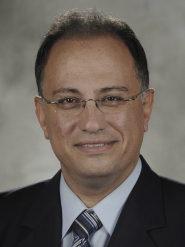
Manos M. Tentzeris (IEEE Fellow)
Ken Byers Professor, Georgia Tech, USA
Invited Talk Title: Zero-Power Additively Manufactured FHE-Enabled Wireless/5G+ Ultrabroadband Modules for IoT, SmartAg, Industry 4.0 and Smart Cities Applications: from dream to reality
Time: 10:30am-11:00am, Wednesday, February 21, 2024
Abstract:
In this talk, inkjet-/3D-printed antennas, interconnects, “smart” encapsulation and packages, RF electronics, RFIDs microfluidics and sensors fabricated on glass, PET, paper and other flexible substrates are introduced as a system-level solution for ultra-low-cost mass production of Millimeter-Wave Modules and Metasurfaces for Communication, Energy Harvesting and Sensing applications. Prof. Tentzeris will touch up the state- of-the-art area of fully-integrated printable FHE-Enabled broadband wireless modules covering characterization of 3D printed materials up to E-band, novel printable “ramp” interconnects and cavities for IC embedding as well as printable structures for self-monitoring and anti-counterfeiting packages. The presented approach could potentially set the foundation for the truly convergent flexible wireless sensor ad-hoc networks of the future with enhanced cognitive intelligence and “rugged” packaging. Prof. Tentzeris will discuss issues concerning the power sources of “near-perpetual” RF modules, including 5G-enabled wireless power grids as well as energy harvesting approaches involving thermal, EM, vibration and solar energy forms. The final step of the presentation will involve examples from shape-changing 4D-printed (origami) packages, reflectarrays and mmW wearable (e.g. biomonitoring) antennas and RF modules. Special attention will be paid on the integration of ultrabroadband (Gb/sec) inkjet-printed nanotechnology-based backscattering communication modules, opto-RF modules as well as miniaturized printable wireless (e.g.CNT) sensors for Internet of Things (IoT), 5G and smart agriculture/biomonitoring applications. It has to be noted that the talk will review and present solutions for “5S Challenges” (Scalability, Sustainability, Speed, Security and Smartness) as well as future directions in the area of environmentally-friendly transient (“green”) RF electronics and “smart-skin’ conformal sensors as well as massively scalable “tile-by-tile” RFID-enabled autonomous reconfigurable intelligent surfaces.
Biography:
Professor Tentzeris was born and grew up in Piraeus, Greece. He graduated from Ionidios Model School of Piraeus in 1987 and he received the Diploma degree in Electrical Engineering and Computer Science (Magna Cum Laude) from the National Technical University in Athens, Greece, in 1992 and the M.S. and Ph.D. degrees in Electrical Engineering and Computer Science from the University of Michigan, Ann Arbor in 1993 and 1998.
He is currently a Professor with the School of ECE, Georgia Tech and he has published more than 550 papers in refereed Journals and Conference Proceedings, 4 books and 23 book chapters, while he is in the process of writing 1 book. He has served as the Head of the Electromagnetics Technical Interest Group of the School of ECE, Georgia Tech. Also, he has served as the Georgia Electronic Design Center Associate Director for RFID/Sensors research from 2006-2010 and as the GT-Packaging Research Center (NSF-ERC) Associate Director for RF research and the leader of the RF/Wireless Packaging Alliance from 2003-2006. Also, Dr. Tentzeris is the Head of the A.T.H.E.N.A. Research Group (20 students and researchers) and has established academic programs in 3D Printed RF electronics and modules, flexible electronics, origami and morphing electromagnetics, Highly Integrated/Multilayer Packaging for RF and Wireless Applications using ceramic and organic flexible materials, paper-based RFID's and sensors, inkjet-printed electronics, nanostructures for RF, wireless sensors, power scavenging and wireless power transfer, Microwave MEM's, SOP-integrated (UWB, mutliband, conformal) antennas and Adaptive Numerical Electromagnetics (FDTD, MultiResolution Algorithms). He was the 1999 Technical Program Co-Chair of the 54th ARFTG Conference and he is currently a member of the technical program committees of IEEE-IMS, IEEE-AP and IEEE-ECTC Symposia. He was the TPC Chair for the IMS 2008 Conference and the Co-Chair of the ACES 2009 Symposium. He was the Chairman for the 2005 IEEE CEM-TD Workshop. He was the Chair of IEEE-CPMT TC16 (RF Subcommittee) and he was the Chair of IEEE MTT/AP Atlanta Sections for 2003. He is a Fellow of IEEE, a member of MTT-15 Committee, an Associate Member of European Microwave Association (EuMA), a Fellow of the Electromagnetics Academy, and a member of Commission D, URSI and of the the Technical Chamber of Greece. He is the Founder and Chair of the newly formed IEEE MTT-S TC-24 (RFID Technologies). He is one of the IEEE C-RFID DIstinguished Lecturers and he has served as one IEEE MTT-Distinguished Microwave Lecturers (DML) from 2010-2012.
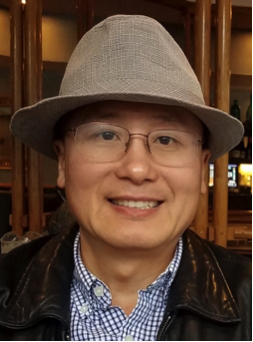
Jie Wang
Professor, University of Massachusetts Lowell, USA
Title: Use AI to Assist In-Depth Paper Reading and Understanding
Time: 16:30pm-17:00pm, Tuesday, February 20, 2024
Abstract:
We present an AI platform to help researchers and PhD students to expedite their research using text AI technologies we developed and empowered by LLMs, including contextual networks to represent relations between texts in an article and AI WordNet to appropriately insert new terminology in a semantic network for a given language, among other things. In this talk, I’ll demo an initial part of this platform that assists in-depth paper reading and understanding. This includes oracle-guided target-oriented reading and task-oriented QA for understanding. I’ll also demo how one may read a paper written in a language they don’t speak, and demo task-oriented search to find research articles based on tasks, all on our platform.
Biography: Dr. Jie “Jed” Wang joined the Department of Computer Science at the University of Massachusetts Lowell in 2001 as Full Professor, and chaired the department for 9 years from 2007 to 2016. He has been Director for greater China Partnership of the US-based Consortium for Mathematics an Its Applications (COMAP) since 2011. He was Assistant Professor of Computer Science and then Associate Professor of Computer Science at the University of North Carolina prior to joining UMass. He received a PhD in Computer Science from Boston University in 1990, an MS in Computer Science and a BS in Computational Mathematics both from Sun Yat-sen University in, respectively, 1984 and 1982. He has 30 years of teaching and research experience and has worked as a network security consultant in a national bank. His research interests include data modeling and applications, text mining and learning, text automation systems, machine learning, algorithms and combinatorial optimizations, medical computation, network security, and computational complexity theory. He has published over 180 journal and conference papers, 12 books, and 4 edited books. His research has been funded by the National Science Foundation, IBM, Intel, and other companies. He is active in professional service, including chairing conference program committees and organizing workshops, serving as journal editors and the editor-in-chief of a book series on mathematical and interdisciplinary modeling. He has graduated 18 PhD students and is currently directing 5 PhD students.
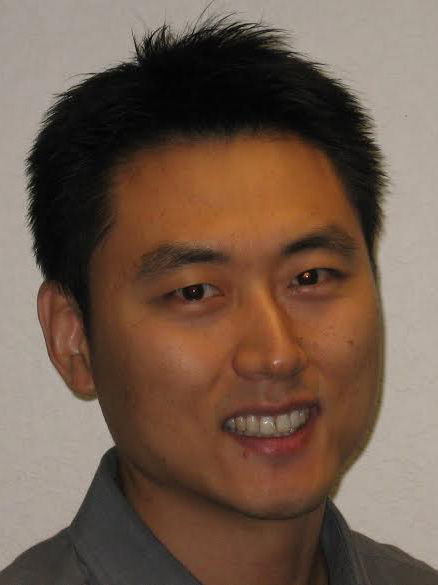
Wei Wang
Professor, San Diego State University, USA
Title: Ride Sharing Inspired Wireless Access Networks
Time: 17:30pm-18:00pm, Wednesday, February 21, 2024
Abstract:
In this talk, the concept of leveraging ride sharing in wireless access networks will be presented, to address the explosive growth of the number of mobile users in future generations of wireless networks. The medium access control problem of wireless users will be modeled using the uber/lyft driver-passenger shared economics concept. Then a game-theoretic solution with a two-stage Stackelberg game will be discussed and the Nash Equilibrium will be derived using a backward induction method. An incentive-driven content shifting framework will be presented to reward users which push multimedia data content from an Orthogonal Multiple Access (OMA) link to a Non-Orthogonal Multiple Access (NOMA). The key issue of strategically splitting the data among the available NOMA and OMA links will be discussed to attain the best possible service quality.
Biography: Dr. Wei Wang is a Professor of Computer Science at San Diego State University (SDSU). He joined San Diego State University in 2014. He was an Assistant Professor of Computer Science at South Dakota State University from 2010 to 2014. He received his Ph.D. degree from University of Nebraska - Lincoln in 2009. His research interests include wireless networks, multimedia communications, QoE-QoS issues, network economics and blockchains. He serves as the symposium co-chair of ICNC-MCC 2024, the poster co-chair of IEEE MSN 2021, publicity co-chair of IEEE/ACM IWQoS 2021, publication co-chair of IEEE INFOCOM 2020, the area chair of IEEE ICME 2019-2020, the symposium co-chair of IEEE GLOBECOM-NGNI 2019, the track-chair of ACM SAC 2019, the web co-chair of IEEE INFOCOM 2016-2018, the symposium co-chair of IEEE ICC-NGNI 2018, the symposium co-chair of ICNC-MCC 2018, the vice chair of IEEE MMTC 2022-2024, and the co-director of IEEE MMTC Review Board 2017-2020.
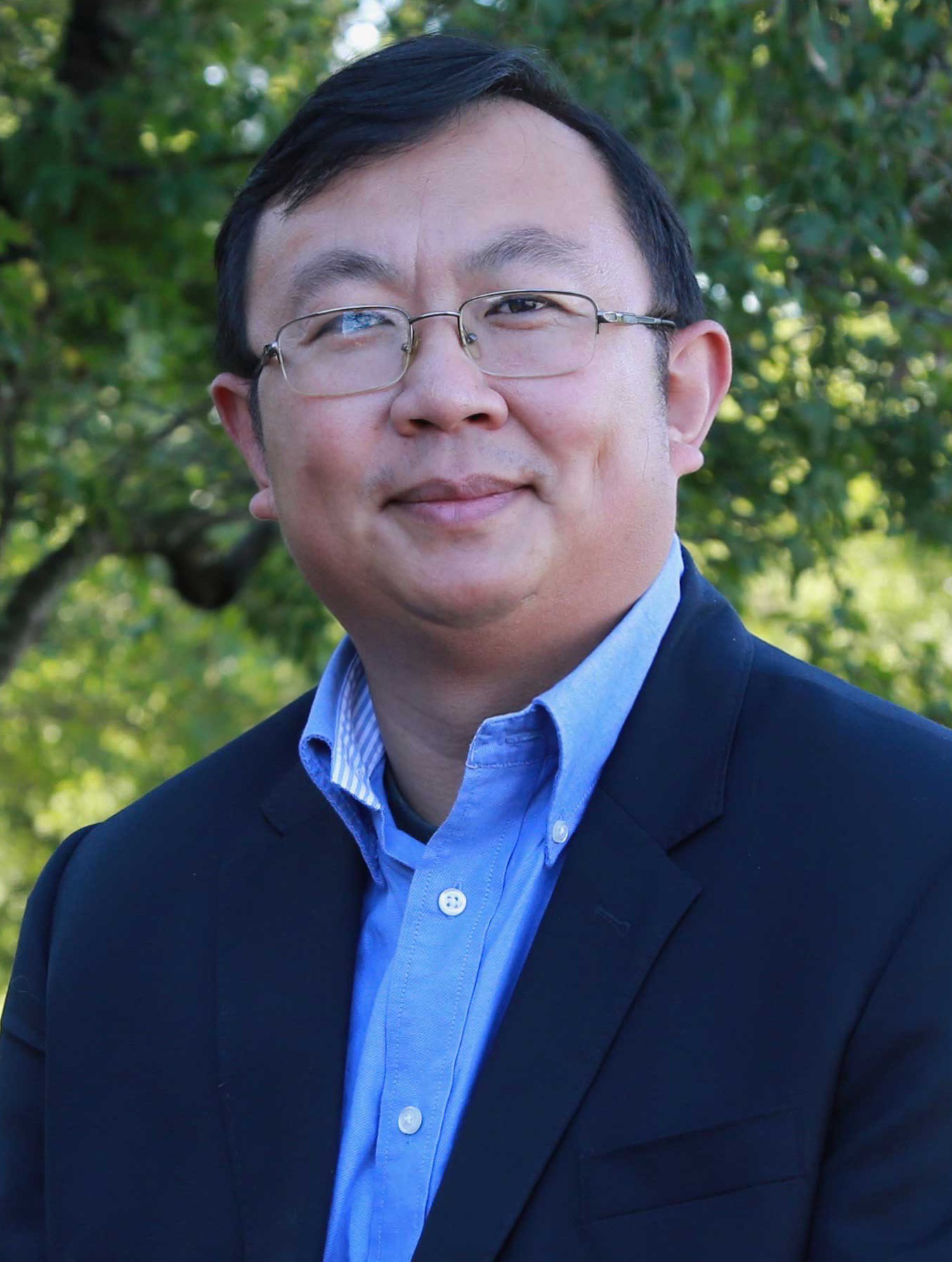
Yu Wang (IEEE Fellow)
Professor, Temple University, USA
Invited Talk Title: Participant Selection and Learning Scheduling for Federated Edge Learning
Time: 16:30pm-17:00pm, Thursday, February 22, 2024
Abstract:
Abstract: Edge computing and federated learning (FL) have gained popularity since they provide a promising edge learning framework that mitigates the limitations of long latency, high cost, and privacy concerns in cloud-based centralized learning. While most existing works on federated edge learning focus on optimizing the training of one shared global model in edge systems, the concurrent training of multiple FL models from different applications in a shared edge cloud can lead to edge resource competition and affect the training performance of each model. Hence, in this talk, I will present our recent works in addressing this challenge by proposing optimization algorithms to jointly select FL participants and learning rates or topologies for each model, with an aim of minimizing the total training cost. Particularly, I will first introduce a multi-stage optimization framework that allows FL models to select their participants and learning rates or learning topologies. Then, I will describe a new Hybrid Quantum-Classical Benders’ Decomposition algorithm to tackle the joint participant selection and learning scheduling problem using both quantum and classical computing. Our methods improve resource competition and load balancing of multi-model FL in shared edge clouds. Finally, I will summarize the talk with discussions about future directions in federated edge learning.
Biography:
Yu Wang is a Professor in the Department of Computer and Information Sciences at Temple University. He holds a Ph.D. from Illinois Institute of Technology, an MEng and a BEng from Tsinghua University, all in Computer Science. His research interest includes wireless networks, smart sensing, and mobile computing. He has published over 300 papers in peer reviewed journals and conferences. He is a recipient of Ralph E. Powe Junior Faculty Enhancement Awards from Oak Ridge Associated Universities (2006), Outstanding Faculty Research Award from University of North Carolina at Charlotte (2008), Fellow of IEEE (2018), and ACM Distinguished Member (2020). He has served as Associate Editor for IEEE Transactions on Parallel and Distributed Systems, IEEE Transactions on Cloud Computing, among others.
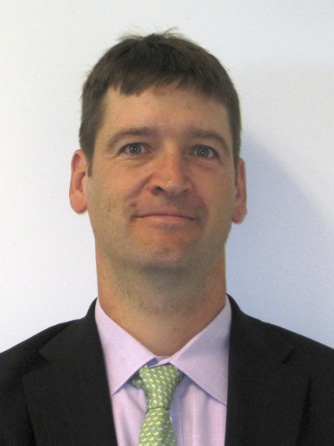
Cedric Westphal
Principal Research Architect, Huawei, USA
Invited Talk Title: A brief history of RDMA over IP
Time: 17:00pm-17:30pm, Thursday, February 22, 2024
Abstract:
Data center workloads are requiring faster protocols to inter-connect. Some proprietary solutions have been deployed over the years, with some benefits. However, interactions with the network layer have proved ripe with challenges. This talk will discuss some of these solutions, and how to integrate them with IP in the context of the DC network and the WAN. It will also discuss potential improvements from the network, in particular regarding the use of RDMA semantics.
Biography:
Cedric Westphal is a Principal Research Architect with Huawei Innovations working on future network architectures, both for wired and wireless networks. His current focus is on Information Centric Networks. He also has been an adjunct assistant professor with the University of California, Santa Cruz since 2009. Prior to Huawei, he was with DOCOMO Innovations from 20072011 in the Networking Architecture Group. His work at DOCOMO has covered several topics, all related to next generation network architectures: scalable routing, network virtualization and reliability, using social networks for traffic offloading, etc. Prior to that, he was at Nokia Research Center (now Nokia Bell Labs) from 2000 to 2006. He received a MSEE in 1995 from Ecole Centrale Paris, and a MS (1995) and Ph.D. (2000) in EE from the University of California, Los Angeles. Cedric Westphal has coauthored over eighty journal and conference papers, including several best paper awards; and been awarded over thirty patents. He was an area editor for the ACM/IEEE Transactions on Networking, an assistant editor for (Elsevier) Computer Networks journal, and a guest editor for Ad Hoc Networks journal and ACM/IEEE JSAC. He has served as a reviewer for the NSF, GENI, the EU FP7, and other funding agencies; he has co-chaired the technical program committee of several conferences, including IEEE ICC (NGN symposium), IEEE NFV-SDN or IEEE IPCCC, and he was the general chair for IEEE INFOCOM 2016. He is a senior member of the IEEE.
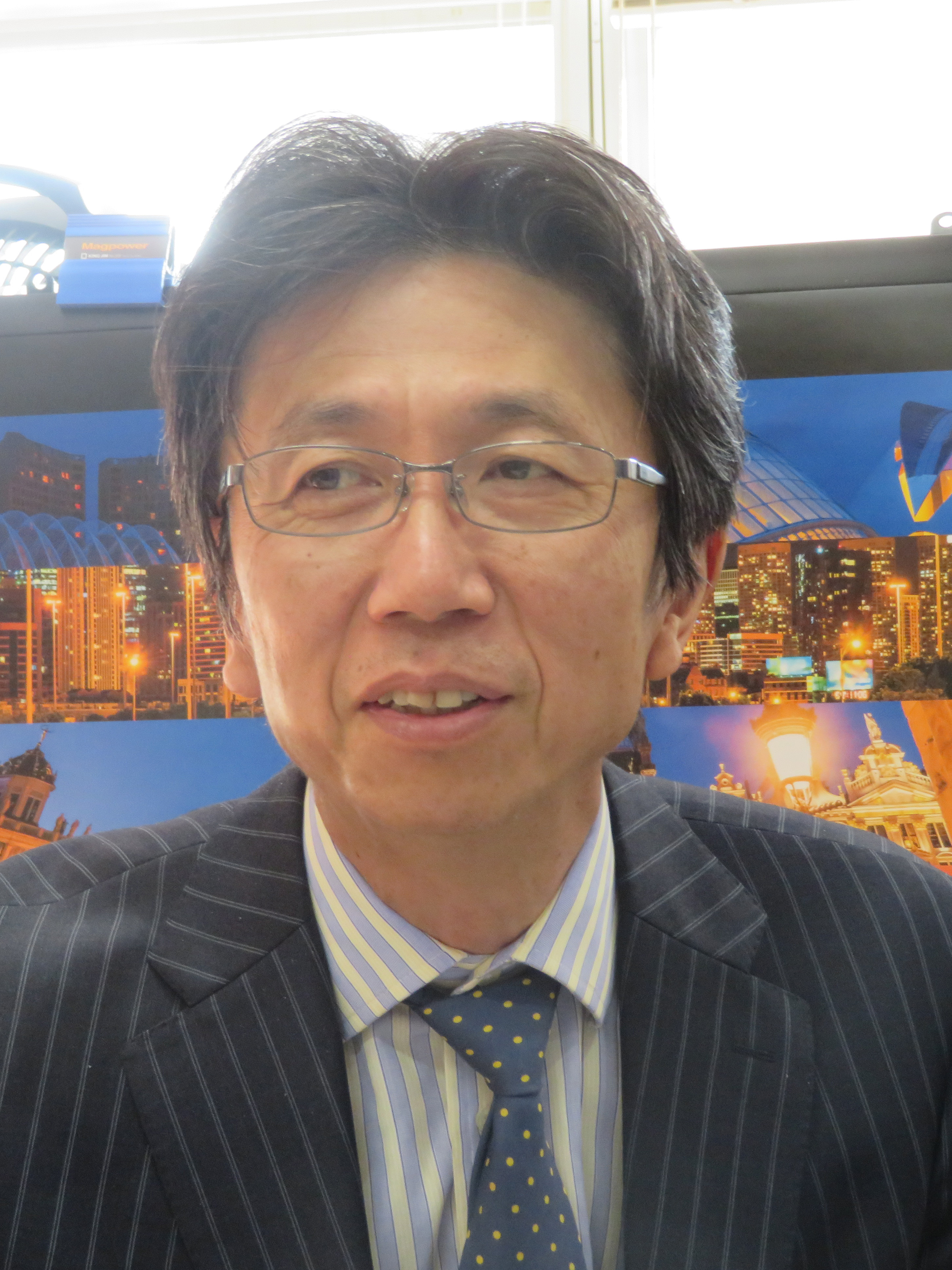
Naoaki Yamanaka (IEEE/IEICE Fellow)
Professor, Keio University, Japan
Invited Talk Title: Time-space synchronized digital twin application for URLLC using newly structured Hollow-Core Fiber and its open innovation field
Time: 11:30am-12:00pm, Wednesday, February 21, 2024
Abstract:
Beyond 5G, ultra-reliable and low latency communication (URLLC) is a key technology.
This paper describes newly structured fiber called Hollow-Core Fiber (HCF) and its applications. High power optical signals can be transmitted through the air core without degradation due to optical non-linearity. The transmission speed is close to the speed of light because the effective index of the HCF is about 1.
So that we propose ultra-multi-wavelength parallel optical paths with hollow-core fiber to realize the ultimate low latency path. The ultra-low latency network in cyber-physical systems enables the cyberspace to be not only accessed with low latency but also spatially and temporally synchronized with the physical space in an area. This is called a time-space synchronized digital twin. This is called a time-space synchronized digital twin. This paper also describes other new futures such as power over fiber (PWoF) and analogue radio over fiber (ARoF) tested in the Keio university future optical network open research center. These technologies will be key to a reliable and smart Beyond 5G society.
Biography:
Dr. Yamanaka graduated from Keio University, Japan where he received B.E., M.E., and Ph. D. degrees in engineering in 1981, 1983 and 1991, respectively. In 1983 he joined Nippon Telegraph and Telephone Corporation's (NTT's) Communication Switching Laboratories, Tokyo, Japan. His research areas are Network Architecture in Optical Network, Cloud Computing, Smart Network, Communication Protocol, and Optical Switching System including Optical Devices. He was a director of Asia Pacific Board at IEEE Communications Society, and is president elect of IEICE. He is an IEEE Fellow, an IEICE Fellow, IPSJ senior member and IEEJ member.
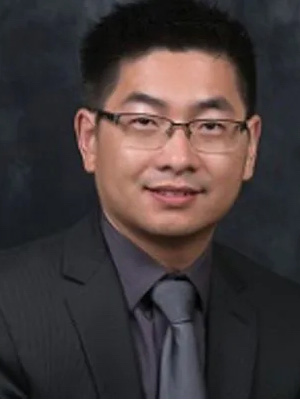
Shucheng Yu (IEEE Fellow)
Associate Professor, Stevens Institute of Technology, USA
Invited Talk Title: Robust and Privacy-Preserving Federated Learning: Cryptographic Perspectives and Wireless Perspectives
Time: 17:00pm-17:30pm, Tuesday, February 20, 2024
Abstract:
Federated Learning (FL) has been a trendy privacy-enhancing technique in distributed systems. In FL, data remains at local devices during the training process. However, data privacy can still be breached in light of data reconstricution attacks or membership inference attacks. For better privacy protection, privacy-protection FL (PPFL) is desired in which local parameters are encrypted or obfuscated before being uploaded. However, PPFL makes model poisoning attacks more convenient. To achieve PPFL and FL robustness simultaneously is a challenge. This talk delves into this problem with both cryptographic approaches and wireless approaches.
Biography:
Shucheng Yu's current research interests include information security, applied cryptography, wireless networking and sensing, distributed trust, and applied machine learning. He is also interested in practical security and privacy in IoT systems.
He is the recipient of the Test of Time Paper Award of IEEE Infocom 2020 for his research on cloud data security. He directs the AISecLab research cluster of the ECE department at Stevens. He is a Fellow of IEEE.
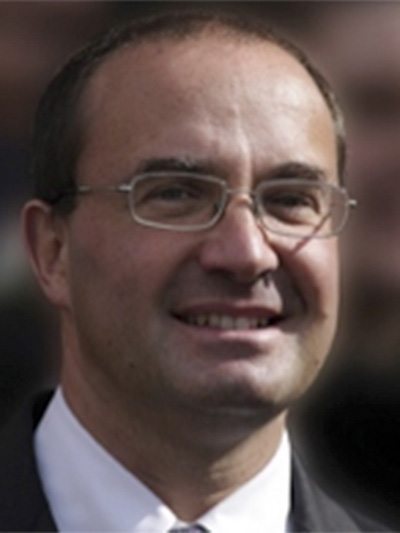
Michele Zorzi (IEEE Fellow)
Professor, University of Padova, Italy
Title: On the Simulation and Evaluation of Non-Terrestrial Networks
Time: 11:30am-12:00pm, Thursday, February 22, 2024
Abstract:
The 5th generation (5G) of mobile networks has landed in the commercial area, and the research community is now exploring new functionalities for 6th generation (6G) networks, for example non-terrestrial networks (NTNs) via space/air nodes such as Unmanned Aerial Vehicles (UAVs), High Altitude Platforms (HAPs) or satellites. While research in this field has been mostly theoretical in nature so far, new simulation platforms have been recently released to numerically evaluate the performance of this paradigm. In particular, in this talk we present a new open-source end-to-end module for ns-3 that implements the NTN physical layer (specifically channel and antenna models) based on 3GPP specifications. However, NTN comes with critical constraints, especially in terms of latency, coverage, and mobility, that may require a massive re-design of the 5G protocol stack. Therefore, we will also discuss current open issues for the proper simulation and evaluation of NTN to stimulate further research in this domain.
Biography:
Michele Zorzi received his Laurea and Ph.D. degrees in electrical engineering from the University of Padova in 1990 and 1994, respectively. During academic year 1992/1993 he was on leave at the University of California San Diego (UCSD). After being affiliated with the Dipartimento di Elettronica e Informazione, Politecnico di Milano, Italy, the Center for Wireless Communications at UCSD, and the University of Ferrara, in November 2003 he joined the faculty of the Information Engineering Department of the University of Padova, where he is currently a professor. His present research interests include performance evaluation in mobile communications systems, random access in mobile radio networks, ad hoc and sensor networks and IoT, energy constrained communications protocols, 5G millimeter-wave cellular systems, and underwater communications and networking. He was Editor-in-Chief of IEEE Wireless Communications from 2003 to 2005, Editor-in-Chief of IEEE Transactions on Communications from 2008 to 2011, and is currently the founding Editor-in-Chief of IEEE Transactions on Cognitive Communications and Networking. He was Guest Editor for several Special Issues in IEEE Personal Communications, IEEE Wireless Communications, IEEE Network, and IEEE JSAC. He served as a Member-at-Large in the Board of Governors of the IEEE Communications Society from 2009 to 2011, and as its Director of Education from 2014 to 2015. He is a Fellow of the IEEE.